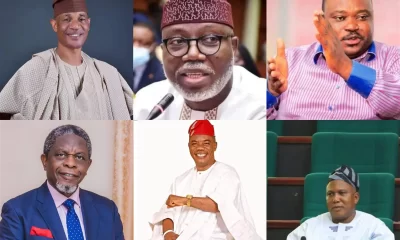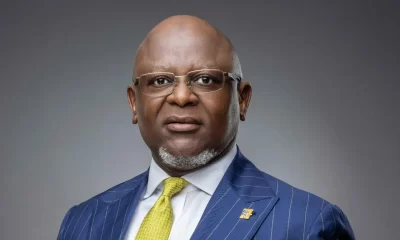Comments and Issues
Nigeria: Hope or nemesis of Africa?
Published
8 months agoon
By
Olu Emmanuel
Let’s begin by discussing the wise counsel and profound words of Patrick Loch Otieno Lumumba, (PLO), a Kenyan lawyer and activist. PLO, a former director of the Kenya School of Law also served as the director of the Kenya Anti-Corruption Commission from July 2010 to August 2011. PLO, profoundly posited: “The day Nigeria wakes up, Africa will never be the same again”. Lumumba added, “We are still suffering from our inferiority complex. We must also ask ourselves are we the only countries that were colonized? India, Japan, Singapore, and others were colonized but they have liberated themselves.” Sadly, hope is in pessimism – when there is life, there is hope.
Nigeria is Africa’s biggest economy but it also has more people living in extreme poverty than anywhere else in the world. Even in a world in which disparities are rapidly increasing, the contradictions and extremes packed into Africa’s largest economy of over two hundred million people are on a different scale altogether. Nigeria has more pastors, priests, malaams, imāms, denominations, churches, and mosques per head than anywhere else in Africa but it is also rife with superstition and an unparalleled disposition for creativity. Yet, Nigeria is probably the most corrupt country in Africa but it also has some of the most honest people on the continent. Million-dollar deals are still made and honored by word of mouth and a handshake. Ironically, Nigerians are a bundle of contradictions as they display external religiosity without the fear of God.
In Nigeria, the dynamics of contradictions that have defined our atrophied existence are poignantly displayed in our current situation. For example, Nigeria is often described as the “Giant of Africa”. With a population of over two hundred million people, it is the most populated country on the continent. Nigeria is rich in natural resources, which include oil, gas, coal, iron ore, tin, limestone, and many others. Nigeria’s natural resources have been a blessing for the country, providing much-needed revenue and contributing to economic growth.
Unfortunately, a wealth of sorrow due to mismanagement through poor political governance. The oil and gas sector, in particular, has been a major source of income for the government, accounting for over 90% of Nigeria’s total exports and about 70% of government revenue. The negative side of Nigeria’s abundance of resources: “resources cursed” or “paradox of plenty” fits the term refers to a nation unable to use its windfall wealth to improve its population’s lot and bolster its economy. Sadly, the rich natural resources bring corruption and poverty to the nation, rather than positive economic prosperity and development, thereby, subjecting vibrancy to despondency and pain for the people.
What A Contradiction! I have always wondered and silently mused on the reason why the Nigerian political gentry —the political class —has floundered, year in and year out, to fix the blessed country. Now, after debating with myself, I think I can put my finger on an open reason; they are supremely inept. Fixing a country —with the right political will —isn’t ‘rocket science’, don’t believe the hype. It is thus, imperative, that rethinking and rewriting the pages of our beautifully imperfect life becomes necessary.
Regrettably, even as this posse of usurpers travel the world, staring wide-eyed at what their counterparts, in the other climes, have achieved, they come back to the country, pinned to continue to uphold the sad status quo; their signature maladministration, characterized by long nepotism and rampant rent-seeking. A political pay-for-play facilitating the ornate lifestyles of an intemperate horde of political hangers-on, who fight and scrimmage —even to death —for a few crumbs and political pickings. This is akin to emotional theatrics in the lives of a nation of over two hundred million people.
Let me be very clear, it’s a shame! But, who’s to blame? We, the people. Our political concessions and writ —whether implicit or explicit —give power to this brutish reign of ineptitude. Where we elect our leaders —every election cycle —on the premises of tribal and religious biases. Where meritocracy and competency take the full-back burner. Therefore, there is a need for a fundamental shift in the way that encourages patriotism and accountability.
Painfully, I remember the open opprobrium and public excoriations I endured in the heat of the last elections. I was hauled over hot coals because I called to reason, to fairness. Chagrined, because I stood un-wavered —setting religious sentiments aside —against an inflammatory ’Muslim-Muslim’ ticket in a country splinted —almost half in half —by Christians and Muslims. Further widening the chasm of tribal and religious mistrust. Further tugging on our fault lines as a heterogeneous nation, 250 tribes strong. Admittedly, we are blameworthy; for we abet their maladroitness. If we stand, with one voice, to right this wrong, putting away tribal dissensions and misgivings, we can fix our country in one lifetime, in one generation. It’s doable. We can.
In conclusion, I like to encourage us with the profound words of Thomas Isidore Noël Sankara, a Burkinabè military officer, Marxist revolutionary, and Pan-Africanist who served as President of Burkina Faso from his military intervention in 1983 to his assassination in 1987. Sankara posited: “We must choose either champagne for a few or safe drinking water for all”. Finally, while being cautiously optimistic, “A safe drinking water for all” will be a better option, as this would give succor to the less-privileged in our beloved country Nigeria. We, the people can do it with a profound sense of responsibility.
Richard Odusanya is a Mind Restructuring Enthusiast.
Trending

 Health & Fitness3 days ago
Health & Fitness3 days agoMalaria Vaccines in Africa: Pastor Chris Oyakhilome and the BBC Attack

 Featured1 week ago
Featured1 week agoPolice reportedly detain Yahaya Bello’s ADC, other security details

 Aviation6 days ago
Aviation6 days agoWhy some airlines are avoiding Nigeria’s airspace–NAMA

 Aviation4 days ago
Aviation4 days agoJust in: Dana airline crash lands in Lagos

 Business1 week ago
Business1 week agoDebt servicing gulps 56% of Nigeria’s tax revenue, says IMF

 Aviation4 days ago
Aviation4 days agoNSIB begins investigation into Dana Air after crash-landing incident

 News1 week ago
News1 week agoOndo APC guber hopefuls reject primary poll

 Business1 week ago
Business1 week agoAdesola Adeduntan steps down as FirstBank CEO

